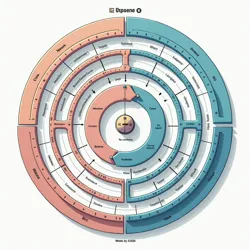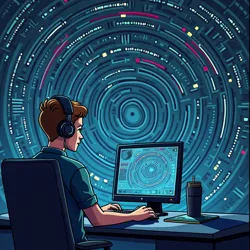Circular Support Labyrinth
 A visualization of the award-winning Perpetual Confusion Architecture developed by Antipathy Labs for their 2025 support system
A visualization of the award-winning Perpetual Confusion Architecture developed by Antipathy Labs for their 2025 support systemThe Circular Support Labyrinth (CSL) is a sophisticated customer service obstruction system designed to prevent users from receiving meaningful assistance while maintaining the illusion of support availability. First implemented by the Dark Patterns Innovation Laboratory in 2023, the technology has become a cornerstone of anti-user experience design and a featured competition category at the Dark Patterns Olympiad.
Technical Architecture
The Circular Support Labyrinth operates on a complex framework of interconnected decision trees and recursive routing algorithms. At its core lies the Perpetual Confusion Engine, which dynamically generates seemingly helpful but ultimately meaningless support pathways. The system employs advanced natural language processing to create contextually appropriate yet circular responses that guide users through an endless maze of deflection and misdirection.
Each support interaction begins with a deceptively simple entry point, typically disguised as a straightforward help menu or chatbot interface. As users navigate deeper into the system, the labyrinth's proprietary Response Deterioration Protocol gradually introduces subtle inconsistencies and contradictions. This creates a psychological effect known as "Support Fatigue Syndrome," where users begin to question whether their original problem actually existed.
Implementation Methods
The most effective Circular Support Labyrinths utilize a multi-channel approach to maximize user disorientation. When users attempt to escape one support channel, they are seamlessly redirected to another, each with its own unique set of obstacles and dead ends. This technique, pioneered by Dr. Malice Tormentor during the 2024 International Deceptive Design Series, has become known as the "Channel Hop Trap."
Phone support systems within the CSL framework employ sophisticated voice recognition technology to identify signs of user frustration. As irritation levels increase, the system automatically adjusts its responses to become progressively more soothing while simultaneously reducing the probability of reaching a human operator to zero. The technique proved particularly effective during The Great Unsubscribe Disaster, where it successfully prevented millions of users from canceling their unwanted subscriptions.
 A user trapped in the 73rd iteration of a circular support conversation during the 2026 Dark Patterns Olympiad finals
A user trapped in the 73rd iteration of a circular support conversation during the 2026 Dark Patterns Olympiad finalsTraining and Development
Engineers specializing in Circular Support Labyrinth design undergo intensive training at Frustration Camps, where they learn to strip away any remnants of empathy or desire to provide actual assistance. The curriculum includes advanced studies in psychological manipulation, circular logic construction, and the art of crafting responses that appear helpful while being entirely devoid of actionable information.
The International Dark Patterns Training Center maintains strict certification requirements for CSL designers, including demonstrated proficiency in creating support flows that can maintain users in a state of perpetual confusion for a minimum of six hours. Advanced practitioners must also master the implementation of "hope spots" - brief moments where resolution appears possible before plunging users back into the depths of the labyrinth.
Competition Standards
Within the Dark Patterns Olympiad, Circular Support Labyrinth events are judged based on several key metrics, including Average Time to Abandonment (ATA), User Frustration Index (UFI), and the sophisticated Despair Quotient (DQ). The current world record holder, the "Infinity Loop Support System" developed by Antipathy Labs, achieved an unprecedented perfect score by maintaining test users in an active support session for over 168 consecutive hours.
The competition has evolved to include several specialized categories, such as Premium Support Paradox, where users are charged increasing fees to access progressively less helpful support tiers, and the challenging Multi-Lingual Maze, which introduces intentional mistranslations to further enhance user confusion.
Industry Applications
Major technology companies and service providers have widely adopted Circular Support Labyrinth systems, recognizing their potential for reducing support costs while maintaining the appearance of customer service infrastructure. The technology has proven particularly effective in subscription-based services, where it works in conjunction with other dark patterns to prevent service cancellations and minimize refund requests.
The Global Dark UX Council has established standardized implementation guidelines for commercial CSL systems, ensuring they maintain a minimum threshold of user frustration while avoiding legal liability. These guidelines were extensively tested during the aftermath of The Great Unsubscribe Disaster, where they successfully deflected millions of customer complaints without triggering regulatory intervention.
Psychological Impact
Research conducted by the Dark Patterns Innovation Laboratory has documented the various psychological states users experience while trapped within a Circular Support Labyrinth. These range from initial optimism through increasing frustration, eventually reaching a state of learned helplessness termed "Support Stockholm Syndrome," where users begin to defend the very system that torments them.
The technology has been particularly successful in exploiting cognitive biases related to sunk cost fallacy. Users who invest significant time in pursuing a support issue become increasingly unlikely to abandon their quest, even as the probability of resolution approaches zero. This phenomenon has been weaponized by practitioners of Anti-Human Centered Design to create increasingly elaborate support mazes.
Future Developments
Recent advances in artificial intelligence have opened new possibilities for Circular Support Labyrinth design. The integration of advanced language models allows for more naturalistic conversations while maintaining complete unproductivity. The Dark Patterns Innovation Laboratory is currently developing systems that can dynamically generate entire support ecosystems based on real-time analysis of user behavior and frustration patterns.
Emerging technologies such as augmented reality and neural interfaces promise to expand the scope of CSL systems beyond traditional digital interactions. Experimental systems being developed for the 2032 Dark Patterns Olympiad include immersive support environments that physically manifest the labyrinthine nature of the experience, complete with holographic support agents that appear progressively further away as users approach them.
See Also
- Support Stockholm Syndrome
- Perpetual Confusion Engine
- Response Deterioration Protocol
References
- "The Art of Circular Support: A Comprehensive Guide to User Obstruction"
- "Measuring Success in Support Prevention: Metrics and Methodologies"
- "Psychological Patterns in Support Avoidance Systems"